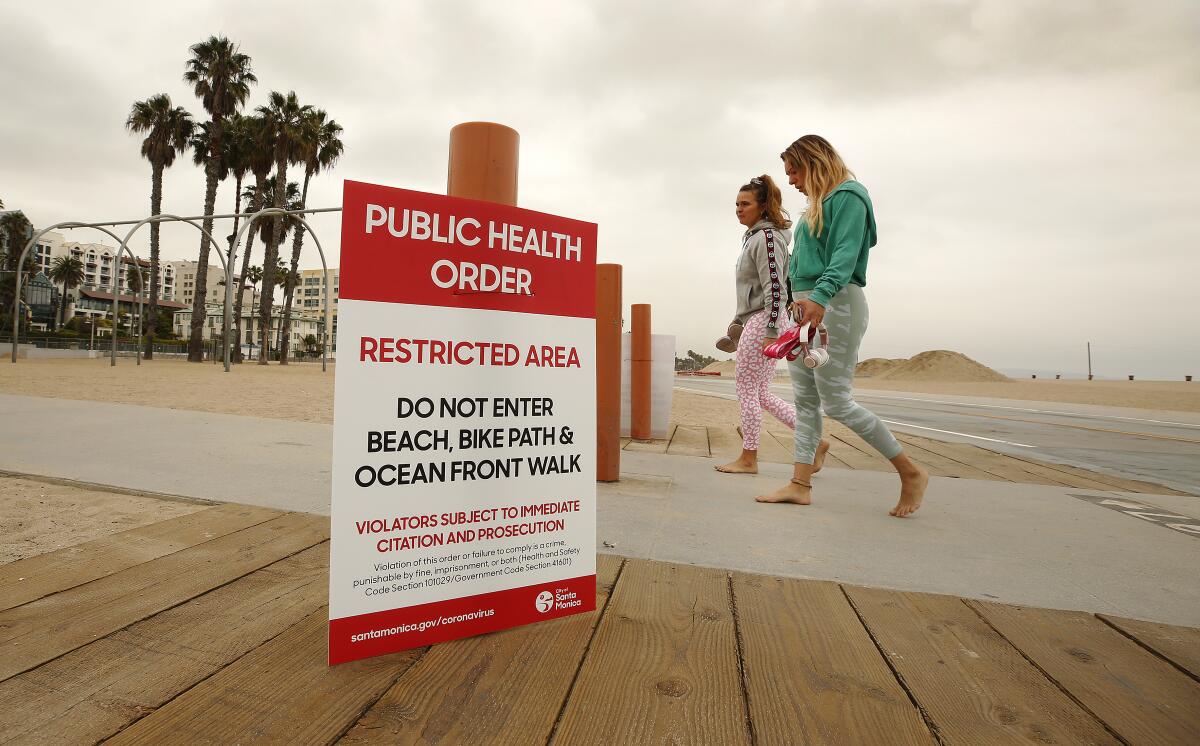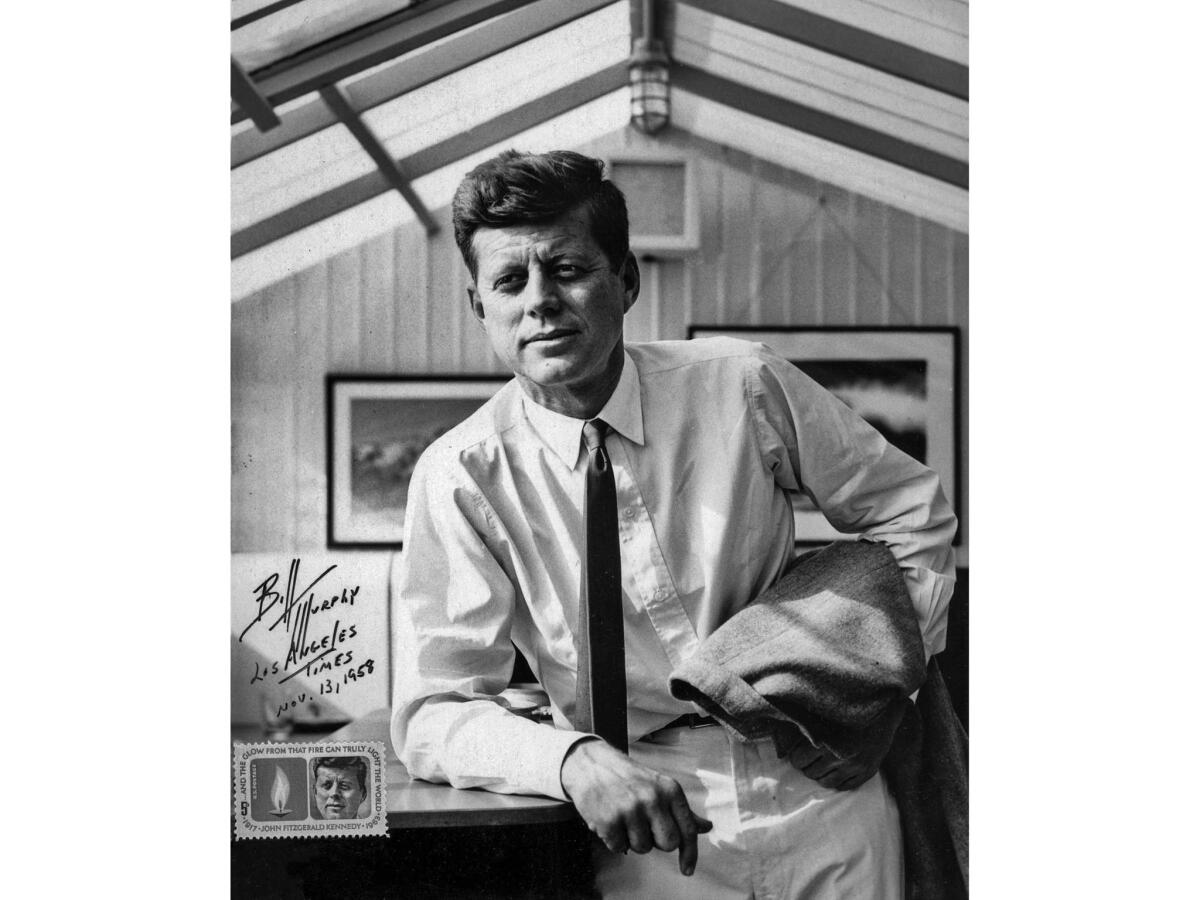Newsletter: California is in for a long haul

- Share via
Officials in California are taking a go-slow approach to reopening during the coronavirus crisis.
TOP STORIES
California Is In for a Long Haul
In California, officials have laid out more tentative plans to reopen the battered economy, including restaurant dining rooms and shopping malls. Even so, there are growing signs that life probably won’t be getting back to normal any time soon.
For the record:
10:22 p.m. May 13, 2020A photo caption in this newsletter incorrectly stated that a photograph of John Kennedy was taken at the Santa Barbara home of Peter Lawford. The home was in Santa Monica.
The 23-campus California State University system plans to all but cancel in-person classes in the fall and instead will offer instruction primarily online. The decision comes as schools throughout the country grapple with how long to keep campuses closed amid the coronavirus crisis.
Health officials in Los Angeles County — a coronavirus hot spot in California with more than 1,600 deaths — also signaled that progress toward reopening could be slow, with some stay-at-home orders lasting well into the summer. County beaches are set to reopen today. But there is no specific timetable for what rules could be lifted next.
Start your day right
Sign up for Essential California for the L.A. Times biggest news, features and recommendations in your inbox six days a week.
You may occasionally receive promotional content from the Los Angeles Times.
L.A. County Public Health Director Barbara Ferrer told the Board of Supervisors that she didn’t see the timeline shortening without “dramatic change to the virus and tools at hand.” She later added that while the stay-at-home policy would probably remain, some individual restrictions will be “gradually relaxed” under the county’s five-step plan.
Officials are urging caution in other parts of California as well. Silicon Valley’s health officer has announced that Santa Clara County has no immediate plans to weaken its strict stay-at-home order, saying she couldn’t take that step without increasing the risk to public safety.
Fauci’s Advice
California’s go-slow approach was echoed by health officials testifying before the U.S. Senate too.
Dr. Anthony Fauci, the nation’s top infectious disease expert, warned senators that states that push too quickly to reopen businesses and allow public gatherings during the pandemic could “trigger an outbreak that you may not be able to control.”
The longtime government scientist largely avoided direct criticism of President Trump or other GOP leaders, but struck a significantly more cautious tone than the president, who has pushed for states to quickly end restrictions on business and other activities that were imposed to blunt the spread of the virus.
“If you think we have it completely under control, we don’t,” Fauci told the panel, warning about a potential surge of infections if states move too fast. “The consequences could be really serious.”
Still, he and other senior administration officials, including the heads of the Centers for Disease Control and Prevention and the Food and Drug Administration, sounded encouraging notes about progress on ramping up testing and the development of potential treatments and vaccines.
Hope and Uncertainty
Janice Brown was the first patient at Desert Valley Hospital in Victorville to test positive for the coronavirus. She was one of the first to be released. She thought she was in the clear, spending weeks — masked but confident — walking around her sister’s home and backyard in Rancho Cucamonga. Neither she nor her doctors or nurses expected her to return. That was early April.
But Brown would test positive a second time. Her story parallels the story of the hospital that treated her twice. “Both narratives are built around a hope that the worst is in the past,” writes reporter Brittney Mejia. “Or, at the least, not waiting on the horizon.”
More Top Coronavirus Headlines
— Airports equipped with full-body scanners, metal detectors and face-recognition technology to identify potential terrorists are starting to make room for devices to target the latest global threat: travelers infected with the novel coronavirus.
— California lawmakers are questioning the state’s vetting of coronavirus contracts after a failed deal in which the state had to claw back $457 million from a newly created and politically connected firm selling protective masks.
— Scores of California businesses have reopened. But in L.A., public health officials say many are not following the safety guidelines required of them to control the spread. Meanwhile, Riverside County has seen an uptick in cases after relaxing stay-at-home orders.
— More than 130 pregnant women in L.A. tested positive for the coronavirus, but none of their babies did, suggesting that it is unlikely for a pregnant mother to pass the virus to her baby during pregnancy.
— Slammed economically by the coronavirus, Santa Monica offers a preview of the crisis to come.
‘Absolute Immunity’?
During more than three hours of arguments Tuesday, U.S. Supreme Court justices sounded open to shielding Trump from broad demands by House Democrats to obtain many years of his tax returns and financial records — while stopping short of giving Trump the kind of absolute protection he is seeking.
The justices, both conservative and liberal, appeared to reject the main rationales cited by both sides in this clash between the White House and Congress.
On one side, lawyers for Trump insisted he was entirely immune from legal demands that he reveal his personal records because of his special status as the nation’s chief executive. The justices were quick to reject that claim.
But they were equally skeptical of the claim that House committees were free to demand from the president huge volumes of personal information, without limits, because the information in theory might lead to new legislation.
FROM THE ARCHIVES
In May 1964, the U.S. Postal Service launched an effort to honor President John F. Kennedy, who had been assassinated in November 1963, with a special edition postage stamp.
The stamp was officially released on May 29, his birthday. But according to a Times story, “first it needed Jackie Kennedy’s stamp of approval.” The stamp ended up featuring a photo taken by Times photographer William S. Murphy. It was one of Jackie Kennedy’s favorites: an informal portrait taken in 1958, when then-Sen. Kennedy visited the Santa Monica beachfront home of his brother-in-law. The final stamp was so popular, post offices sold out and more than 500 million were eventually printed.

CALIFORNIA
— Republican Mike Garcia jumped to an early lead over Democrat Christy Smith in the runoff for a House seat in the Los Angeles suburbs, raising GOP hopes of flipping a blue California congressional district for the first time since 1998.
— The Los Angeles Police Department released officer body-camera footage from a violent clash in Boyle Heights that appeared to show an officer punching an unarmed homeless man.
— A federal court has temporarily blocked the Trump administration’s efforts to pump more water to the agricultural Central Valley, which critics said would threaten endangered species and salmon runs.
— Neon blue flashes illuminated the California coast for weeks. Then came a smelly mess of dying algae, the end stage of a red tide.
Support our journalism
Subscribe to the Los Angeles Times.
NATION-WORLD
— A federal judge made clear that he would not immediately rule on the Justice Department’s decision to dismiss its criminal case against former Trump national security advisor Michael Flynn, saying he would instead let outside individuals and groups weigh in with their opinions.
— Lawyers who represent migrant kids say the Trump administration is refusing to release children to ready sponsors, citing the coronavirus. Administration attorneys have argued in court that the children are safer in custody — even as the government quietly ramps up efforts to deport them.
— Secretary of State Michael R. Pompeo headed to Jerusalem to bolster besieged Israeli Prime Minister Benjamin Netanyahu and bestow a U.S. blessing on his country’s proposed de facto annexation of West Bank land claimed by Palestinians.
— How a night out jeopardized South Korea’s COVID-19 response and sparked a homophobic backlash.
— Another viral disease, dengue fever, is relentlessly spreading across Southeast Asia.
HOLLYWOOD AND THE ARTS
— Russell Crowe’s new movie “Unhinged” is expected to be the first major new theatrical release since the coronavirus outbreak closed U.S. multiplexes in mid-March. But will audiences show up July 1?
— Disney will release “Hamilton” on its Disney+ streaming service on July 3. The movie version of the musical combines three live performances featuring the original Broadway cast.
— Live performances are on hold, but artists still have the music video. How Zoom footage, biohazard suits, low budgets and animation are refreshing and even democratizing an art form in the quarantine age.
— Jimmy Kimmel says he didn’t know Vice President Mike Pence was joking about carrying empty boxes of personal protective equipment when he made a video that went viral — and that people sent death threats to Kimmel and his family.
BUSINESS
— There’s no shortage of demand for beef, and there’s no shortage of cattle earmarked to be turned into beef. Yet in between, prices are up, grocery stores are limiting sales and Wendy’s restaurants are running out of hamburgers as the coronavirus bottlenecks the supply chain.
— Elon Musk‘s SpaceX is seeking almost $656,000 in new funding from California in the midst of his battle over whether Tesla should be reopening its plant in the state.
— The Trump administration approved the largest solar installation in U.S. history, giving its blessing to a Berkshire Hathaway Inc. subsidiary’s project near Las Vegas.
SPORTS
— The Anaheim City Council has voted to allow Angels owner Arte Moreno to submit his plan for the Angel Stadium site ahead of schedule but granted him an additional three months to decide whether to walk away from the deal.
— A golf caddie academy is offering low-income kids in Los Angeles a pathway into college, no golf knowledge required.
Free online games
Get our free daily crossword puzzle, sudoku, word search and arcade games in our new game center at latimes.com/games.
OPINION
— Trump wants to be above the law. The Supreme Court shouldn’t help him, The Times’ editorial board writes.
— The race is on to find treatments and a vaccine for COVID-19. Columnist David Lazarus asks: Are we sacrificing our medical privacy in the process?
WHAT OUR EDITORS ARE READING
— Fox News host Tucker Carlson took aim at Fauci, calling the top infectious disease expert the “chief buffoon.” He’s not alone among conservatives who have voiced their displeasure with Fauci. (Daily Beast)
— Tired of living in your own brain? Visit Werner Herzog‘s: The director reflects on the brutality of nature, whether dogs are cute and how to prepare for a quarantine in the Hollywood Hills. (New York Times Magazine)
ONLY IN L.A.
As a hockey player and a surfer, Hogan Peters has used a lot of wax on the blade of his hockey stick and his surfboard. Then he started thinking about the ingredients in that wax and decided there was a better way. In his Loyola Marymount dorm room, he created an environmentally friendly alternative. But the market dried up when the pandemic put sports on hold. So he pivoted to making soap — and has given several hundred bars to El Camino College’s Warrior Pantry for students who struggle to buy food and toiletries.
Comments or ideas? Email us at headlines@latimes.com.
Sign up for Essential California
The most important California stories and recommendations in your inbox every morning.
You may occasionally receive promotional content from the Los Angeles Times.





